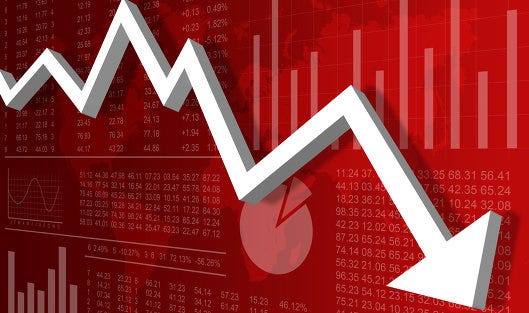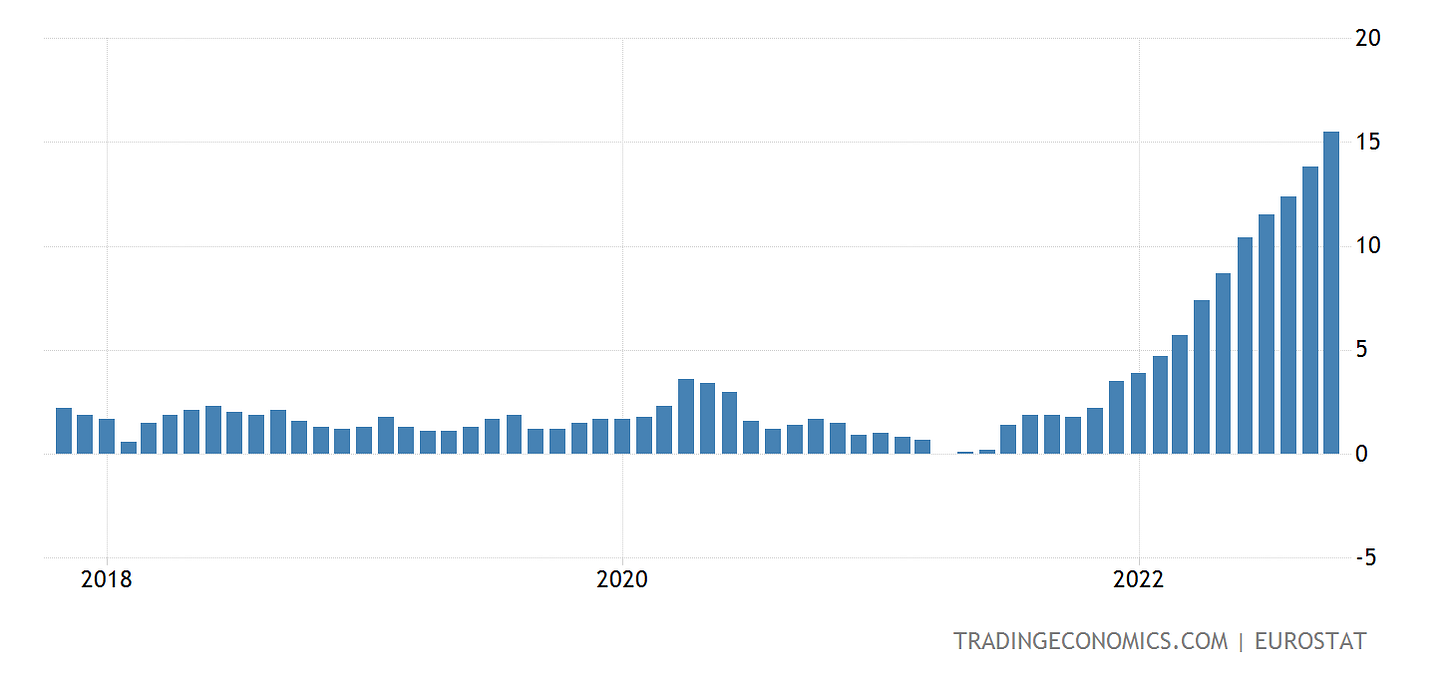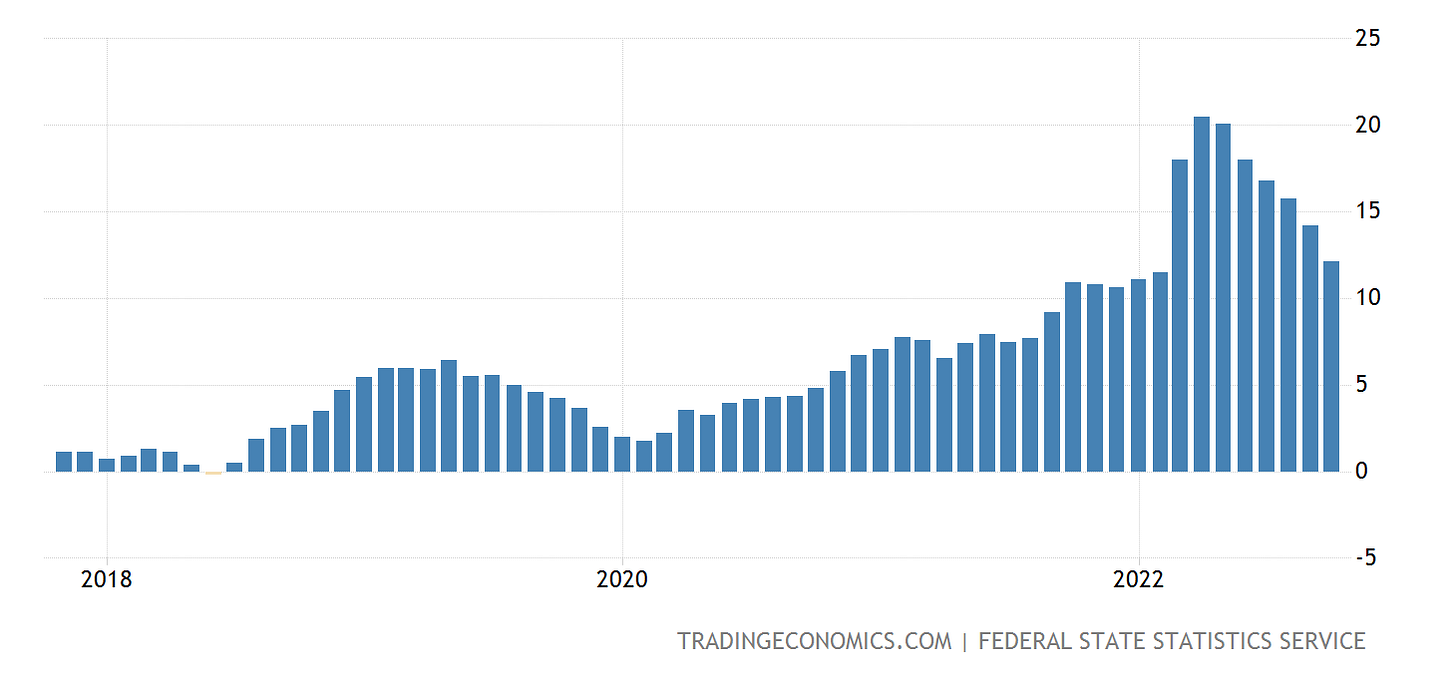Even as Russia is locked in a grim war of attrition in Ukraine, enduring untold casualties while inflicting untold loss of life on both Ukrainian forces and Ukrainian civilians, it is engaged in a much larger war of attrition with Europe. The outcome of that contest will reverberate across the continent for decades to come.
The War In Ukraine Has Been A Body Blow To Europe’s Economy
I have already detailed how Europe’s economy has suffered as a result both of Russia’s war in Ukraine and the west’s sanctions against Russia.
The ongoing challenge of replacing Russian energy sources is still a persistent drag on the European economy, even though energy prices—natural gas prices in particular—have declined since the summer, and have only just begun to move back up as winter sets in across the continent.
Despite this recent moderation in energy prices, European energy prices are still considerably higher than they were a year ago, and energy price inflation remains a significant contributor to Europe’s current double-digit inflation.
Even more alarming is that food price inflation in Europe has been steadily rising since the start of the war.
Where food price inflation is rampant, food insecurity is never far behind, and outright hunger is waiting in the wings.
To put it mildly, Europe’s economy is in a very fragile state, and is likely to get even more fragile over the next few months.
Russia Is Also Paying A High Price For War
Yet Europe is not alone in its economic peril. In many regards, Russia’s situation is at least as dire, and in some respects even more so.
Inflation skyrocketed immediately after the invasion of Ukraine, and while it has receded considerably, it remains considerably higher than just prior to the invasion.
Moreover, Russia’s core inflation rate—headline consumer prices less food and energy—remains significantly higher than the headline inflation rate, indicating deep and significant distortions within the Russian economy.
Even food price inflation only just in October slipped below the headline inflation rate—and Russia is a primary food exporter, which suggests serious problems within Russian agriculture, making food insecurity a distinct probability.
At the same time inflation is distorting the Russian economy, Russian industrial production is in its seventh consecutive month of contraction.
One metric where Russia appears in a better light than in Europe is its Manufacturing PMI.
On that basis at least, Russia is still managing to report some marginal manufacturing growth, unlike Europe which is in the midst of an extended and deepening contraction.
Yet it would be a mistake to assume Russia’s manufacturing sector is at all healthy. For Russia, the most worrisome sign of their manufacturing woes is their ongoing inability to adequately supply their front-line forces in Ukraine.
Russia has already paid a steep economic price for its war in Ukraine, and all indications are that it will pay an even steeper price until peace is finally achieved—win, lose, or draw.
An Economic Grudge Match
With sanctions and European opprobrium for Russia’s missile attacks on civilian populations—a blatant and indisputable war crime—Russia indeed finds itself fighting a war on two fronts: a military front in Ukraine, and an economic front in Europe. On both fronts it is bloodying its opponents and is being bloodied in return.
Regardless of what Putin intended when he first invaded Ukraine, what he has now is an economic grudge match with those who were once his best customers for energy exports and principal trading partners. The commerce that sustained both Russia and the EU is now all but gone, and it is difficult to see how any of it can be quickly restored. Even if Russia should sue for peace now, much of the damage to Europe’s economy is quasi-permanent, with companies and plants that have shut down in some instances shuttered for good.
Permanent economic damage means Europe’s overall GDP has not only been reduced, but its prospects for future growth have also been reduced. Less growth in Europe means less demand for Russian energy—and thus a permanent reduction in Russian GDP.
There is no telling at this point which side will prevail in this economic grudge match. However, which side technically is the last one standing, it will still be greatly diminished if not crippled as a result of the fight.
That alone should commend the path of peace to everyone. Unfortunately, all sides have chosen war, consequences be damned.













In no other media form but here will anyone see the word, "win," in a headline about the war in Ukraine. Everyone silently assumes the only "winners" are companies that make things that go boom. (I wonder. Do bomb-makers have to file environmental impact statements for each bomb?)
PNK, perhaps you will comment on this.
Months ago I heard one of the energy consultants on a conservative radio show, perhaps Glenn Beck, remark how there has been a trillion dollars less investment in North America's energy grid.
The money has simply gone elsewhere since the Biden Administration took over. I simply feel that the same thing must be true in Europe, or at least parts of it.
Some mistakes you don't get to make twice!